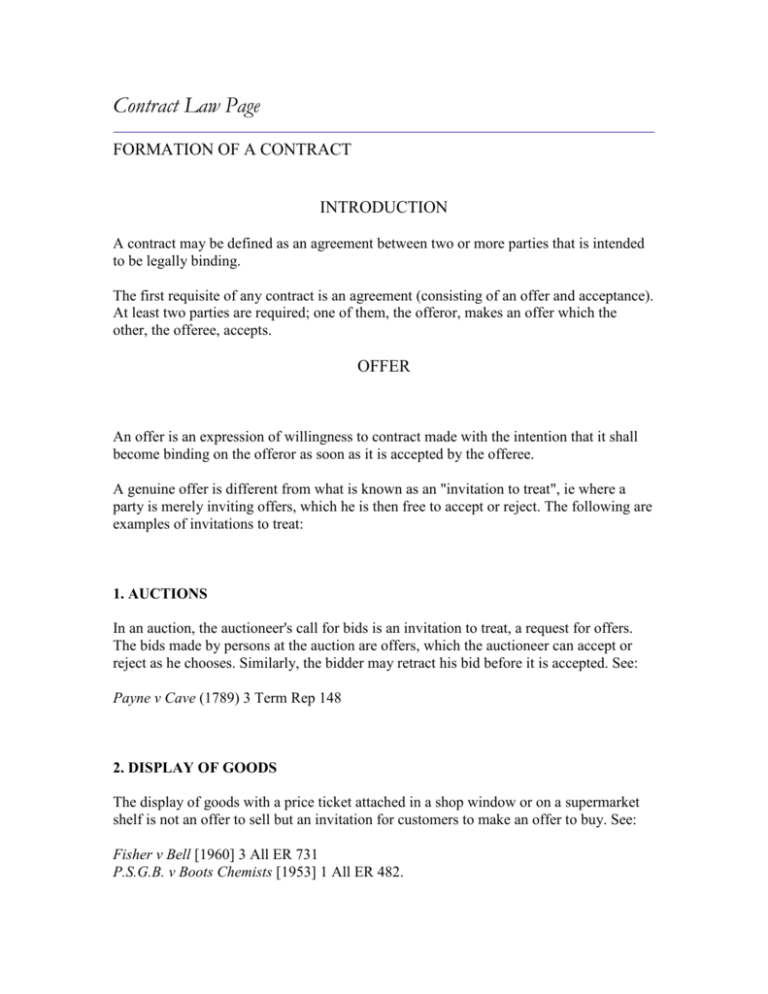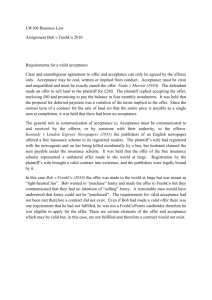Contract Law Page
advertisement

Contract Law Page FORMATION OF A CONTRACT INTRODUCTION A contract may be defined as an agreement between two or more parties that is intended to be legally binding. The first requisite of any contract is an agreement (consisting of an offer and acceptance). At least two parties are required; one of them, the offeror, makes an offer which the other, the offeree, accepts. OFFER An offer is an expression of willingness to contract made with the intention that it shall become binding on the offeror as soon as it is accepted by the offeree. A genuine offer is different from what is known as an "invitation to treat", ie where a party is merely inviting offers, which he is then free to accept or reject. The following are examples of invitations to treat: 1. AUCTIONS In an auction, the auctioneer's call for bids is an invitation to treat, a request for offers. The bids made by persons at the auction are offers, which the auctioneer can accept or reject as he chooses. Similarly, the bidder may retract his bid before it is accepted. See: Payne v Cave (1789) 3 Term Rep 148 2. DISPLAY OF GOODS The display of goods with a price ticket attached in a shop window or on a supermarket shelf is not an offer to sell but an invitation for customers to make an offer to buy. See: Fisher v Bell [1960] 3 All ER 731 P.S.G.B. v Boots Chemists [1953] 1 All ER 482. 3. ADVERTISEMENTS Advertisements of goods for sale are normally interpreted as invitations to treat. See: Partridge v Crittenden [1968] 2 All ER 421. However, advertisements may be construed as offers if they are unilateral, ie, open to all the world to accept (eg, offers for rewards). See: Carlill v Carbolic Smoke Ball Co [1893] 1 QB 256. 4. MERE STATEMENTS OF PRICE A statement of the minimum price at which a party may be willing to sell will not amount to an offer. See: Harvey v Facey [1893] AC 552 Gibson v Manchester County Council [1979] 1 All ER 972. 5. TENDERS Where goods are advertised for sale by tender, the statement is not an offer, but an invitation to treat; that is, it is a request by the owner of the goods for offers to purchase them. The process of competitive tendering came under scrutiny in the following cases: Harvela Investments v Royal Trust Co. of Canada [1985] 2 All ER 966 Blackpool Aero Club v Blackpool Borough Council [1990] 3 All ER 25. ACCEPTANCE An acceptance is a final and unqualified acceptance of the terms of an offer. To make a binding contract the acceptance must exactly match the offer. The offeree must accept all the terms of the offer. However, in certain cases it is possible to have a binding contract without a matching offer and acceptance. See: Brogden v Metropolitan Railway Co. (1877) 2 App Cas 666 Lord Denning in Gibson v Manchester City Council [1979] above Percy Trentham Ltd v Archital Luxfer Ltd [1993] 1 Lloyd's Rep 25. The following rules have been developed by the courts with regard to acceptance: 1. COUNTER OFFERS If in his reply to an offer, the offeree introduces a new term or varies the terms of the offer, then that reply cannot amount to an acceptance. Instead, the reply is treated as a "counter offer", which the original offeror is free to accept or reject. A counter-offer also amounts to a rejection of the original offer which cannot then be subsequently accepted. See: Hyde v Wrench (1840) 3 Beav 334. A counter-offer should be distinguished from a mere request for information. See: Stevenson v McLean (1880) 5 QBD 346. If A makes an offer on his standard document and B accepts on on a document containing his conflicting standard terms, a contract will be made on B's terms if A acts upon B's communication, eg by delivering goods. This situation is known as the "battle of the forms". See: Butler Machine Tool v Excell-o-Corp [1979] 1 All ER 965. 2. CONDITIONAL ACCEPTANCE If the offeree puts a condition in the acceptance, then it will not be binding. 3. TENDERS A tender is an offer, the acceptance of which leads to the formation of a contract. However, difficulties arise where tenders are invited for the periodical supply of goods: (a) Where X advertises for offers to supply a specified quantity of goods, to be supplied during a specified time, and Y offers to supply, acceptance of Y's tender creates a contract, under which Y is bound to supply the goods and the buyer X is bound to accept them and pay for them. (b) Where X advertises for offers to supply goods up to a stated maximum, during a certain period, the goods to be supplied as and when demanded, acceptance by X of a tender received from Y does not create a contract. Instead, X's acceptance converts Y's tender into a standing offer to supply the goods up to the stated maximum at the stated price as and when requested to do so by X. The standing offer is accepted each time X places an order, so that there are a series of separate contracts for the supply of goods. See: Great Northern Railway Co. v Witham (1873) LR 9 CP 16. 4. COMMUNICATION OF ACCEPTANCE The general rule is that an acceptance must be communicated to the offeror. Until and unless the acceptance is so communicated, no contract comes into existence: Lord Denning in Entores v Miles Far East Corp. [1955] 2 All ER 493. The acceptance must be communicated by the offeree or someone authorised by the offeree. If someone accepts on behalf of the offeree, without authorisation, this will not be a valid acceptance: Powell v Lee (1908) 99 LT 284. The offeror cannot impose a contract on the offeree against his wishes by deeming that his silence should amount to an acceptance: Felthouse v Bindley (1862) 11 CBNS 869. Where an instantaneous method of communication is used, eg telex, it will take effect when and where it is received. See: Entores v Miles Far East Corp [1955] 2 QB 327 The Brimnes [1975] QB 929 Brinkibon v Stahag Stahl [1983] 2 AC 34. 5. EXCEPTIONS TO THE COMMUNICATION RULE a) In unilateral contracts the normal rule for communication of acceptance to the offeror does not apply. Carrying out the stipulated task is enough to constitute acceptance of the offer. b) The offeror may expressly or impliedly waive the need for communication of acceptance by the offeree, eg, where goods are dispatched in response to an offer to buy. c) The Postal Rule - Where acceptance by post has been requested or where it is an appropriate and reasonable means of communication between the parties, then acceptance is complete as soon as the letter of acceptance is posted, even if the letter is delayed, destroyed or lost in the post so that it never reaches the offeror. See: Adams v Lindsell (1818) 1 B & Ald 681. Household Fire Insurance Co. v Grant (1879) 4 Ex D 216. The postal rule applies to communications of acceptance by cable, including telegram, but not to instantaneous modes such as telephone, telex and fax. The postal rule will not apply: (i) Where the letter of acceptance has not been properly posted, as in Re London and Northern Bank (1900), where the letter of acceptance was handed to a postman only authorised to deliver mail and not to collect it. (ii) Where the letter is not properly addressed. There is no authority on this point. (iii) Where the express terms of the offer exclude the postal rule, ie if the offer specifies that the acceptance must reach the offeror. In Holwell Securities v Hughes (1974, below), the postal rule was held not to apply where the offer was to be accepted by "notice in writing". Actual communication was required. (iv) It was said in Holwell Securities that the rule would not be applied where it would produce a "manifest inconvenience or absurdity". Revocation of posted acceptance. Can an offeree withdraw his acceptance, after it has been posted, by a later communication, which reaches the offeror before the acceptance? There is no clear authority in English law. The Scottish case of Dunmore v Alexander (1830) appears to permit such a revocation but it is an unclear decision. A strict application of the postal rule would not permit such withdrawal. This view is supported by decisions in: New Zealand in Wenkheim v Arndt (1873) and South Africa in A-Z Bazaars v Ministry of Agriculture (1974). However, such an approach is regarded as inflexible. 6. METHOD OF ACCEPTANCE The offer may specify that acceptance must reach the offeror in which case actual communication will be required. See: Holwell Securities v Hughes [1974] 1 All ER 161. If a method is prescribed without it being made clear that no other method will suffice then it seems that an equally advantageous method would suffice. See: Tinn v Hoffman (1873) 29 LT 271 Yates Building Co. v Pulleyn Ltd (1975) 119 SJ 370. 7. KNOWLEDGE OF THE OFFER An offeree may perform the act that constitutes acceptance of an offer, with knowledge of that offer, but for a motive other than accepting the offer. The question that then arises is whether his act amounts to a valid acceptance. The position seems to be that: (a) An acceptance which is wholly motivated by factors other than the existence of the offer has no effect. R v Clarke (1927) 40 CLR 227 (b) Where, however, the existence of the offer plays some part, however small, in inducing a person to do the required act, there is a valid acceptance of the offer. See: Williams v Carwardine (1833) 5 Car & P 566. 8. CROSS-OFFERS A writes to B offering to sell certain property at a stated price. B writes to A offering to buy the same property at the same price. The letters cross in the post. Is there (a) an offer and acceptance, (b) a contract? This problem was discussed, obiter, by the Court in Tinn v Hoffman (1873) 29 LT 271. Five judges said that cross-offers do not make a binding contract. One judge said they do. TERMINATION OF THE OFFER 1. ACCEPTANCE Once an offer has been accepted, a binding contract is made and the offer ends. 2. REJECTION If the offeree rejects the offer that is the end of it. 3. REVOCATION The offer may be revoked by the offeror at any time until it is accepted. However, the revocation of the offer must be communicated to the offeree(s). Unless and until the revocation is so communicated, it is ineffective. See: Byrne v Van Tienhoven (1880) 5 CPD 344. The revocation need not be communicated by the offeror personally, it is sufficient if it is done through a reliable third party. See: Dickinson v Dodds (1876) 2 ChD 463. Where an offer is made to the whole world, it appears that it may be revoked by taking reasonable steps. See: Shuey v United States [1875] 92 US 73. Once the offeree has commenced performance of a unilateral offer, the offeror may not revoke the offer. See: Errington v Errington [1952] 1 All ER 149 Daulia v Four Millbank Nominees [1978] 2 All ER 557. 4. COUNTER OFFER See above for Hyde v Wrench (1840). 5. LAPSE OF TIME Where an offer is stated to be open for a specific length of time, then the offer automatically terminates when that time limit expires. Where there is no express time limit, an offer is normally open only for a reasonable time. See: Ramsgate Victoria Hotel v Montefiore (1866) LR 1 Ex 109. 6. FAILURE OF A CONDITION An offer may be made subject to conditions. Such a condition may be stated expressly by the offeror or implied by the courts from the circumstances. If the condition is not satisfied the offer is not capable of being accepted. See: Financings Ltd v Stimson [1962] 3 All ER 386. 7. DEATH The offeree cannot accept an offer after notice of the offeror's death. However, if the offeree does not know of the offeror's death, and there is no personal element involved, then he may accept the offer. See: Bradbury v Morgan (1862) 1 H&C 249.







